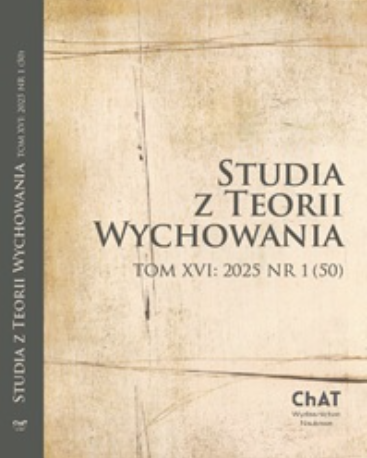Pedagogia noża – studium przypadku reautoryzacji mitu personalnego męskości. Pogranicze pedagogiki lasu i psychologii kultury
Pedagogy of the knife – a case study of the re-authorisation of the personal myth of masculinity. Field of forest pedagogy and cultural psychology
Author(s): Michał Paluch, Andrzej PankallaSubject(s): Social Sciences, Education, Psychology
Published by: Wydawnictwo Naukowe ChAT
Keywords: pedagogy of the knife; mythotherapy; forest pedagogy; cultural psychology; crisis of masculinity
Summary/Abstract: The title of the article indicates several dimensions of the analyses undertaken: 1) the archetype of the knife as a carrier of unconscious meanings, especially pedagogically and psychologically relevant meanings; 2) the re-authorization of the personal myth as a method of experiencing self-identification, self-therapy and self-education, freeing men from the sources of current restlessness; 3) the crisis of masculinity as a dilemma on the nature-culture axis, posed to men by the current cultural (dis)course. The positive and pedagogical significance of the ‘knife’, which is laden with pejorative connotations, was also emphasised. Research conclusions were derived using the autoethnographic-existential method, based on: 1) a self-description of the author’s experienced experiences, during the ordering of a handmade knife, necessary for the construction of a forest pedagogical settlement for families with children; 2) an interview conducted with a knife maker (blacksmith), on the content of the orders reported to him. An important part of the analysis falls within the perspective of cultural psychology and mythotherapy, undertaken on the grounds of forest pedagogy, as the main theoretical framework. On this basis, the connection and entanglement of an unfulfilled sense of masculinity with a probable deficit in the experience of independence (fighting for freedom, protecting the family, defending the territory) was discovered. It follows that they are deeply rooted in Polish history and the intergenerational nature of familialism, and can make themselves known in the form of activities that are only seemingly mundane. Tytuł artykułu wskazuje na kilka wymiarów podjętych analiz: 1) archetypu noża jako nośnika nieuświadomionych znaczeń, a w szczególności znaczeń istotnych pedagogicznie i psychologicznie; 2) reautoryzacji mitu personalnego jako metody doświadczania autoidentyfikacji (autostwarzania), a nawet autoterapii i samokształcenia, uwalniających człowieka z nieuświadomionych źródeł aktualnego nie(s)pokoju, a zarazem wzbogacającej o wartość symboliczną; 3) kryzysu męskości jako dylematu na osi natura – kultura, stawianego wobec mężczyzn przez aktualny (dys)kurs kulturowy. Zaakcentowano również pozytywne i pedagogiczne znaczenie „nóża”, który obarczony jest pejoratywnymi skojarzeniami. Wnioski badawcze zostały wyprowadzone metodą autoetnograficzno-egzystencjalną, w oparciu o: 1) samoopis doświadczonych przez autora przeżyć, podczas zamawiania ręcznie wykonywanego noża, niezbędnego przy budowie leśnej osady pedagogicznej dla rodzin z dziećmi; 2) przeprowadzonej rozmowy z twórcą noży (kowalem), na temat treści zgłaszanych do niego zamówień. Istotna część analiz mieści się w perspektywie psychologii kultury i mitoterapii, podejmowanych na gruncie pedagogiki lasu, jako głównych ram teoretycznych. Na tej podstawie odkryto powiązanie i uwiązanie niespełnionego poczucia męskości z prawdopodobnym deficytem doświadczeń niepodległościowych (walki o wolność, ochrony rodziny, obrony terytorium). Wynika z tego, że są one głęboko zakorzenione w polskiej historii i międzypokoleniowej naturze rodzinności i mogą dać o sobie znać w postaci czynności tylko pozornie prozaicznych.
Journal: Studia z Teorii Wychowania
- Issue Year: XVI/2025
- Issue No: 1(50)
- Page Range: 49-71
- Page Count: 23
- Language: Polish

